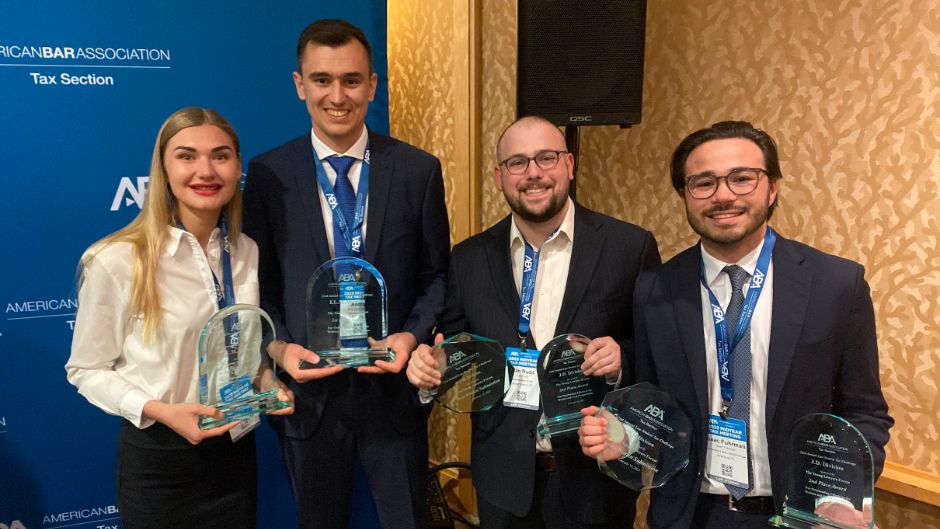Miami Law's tax teams recently placed first and second in their divisions in the American Bar Association Tax Section's Law Student Tax Challenge, a national competition held in San Diego.
The Tax LL.M. team, consisting of Margo Bahno and Andrii Buznytskyi, won first place, and the J.D. team of Ivan Rudd and Isaac Fuhrman Borgman came in second place and won the award for Best Written submission in their division.
"We were so excited when we won, yet surprised," said Buznytskyi. "Winning in the final oral rounds meant a lot for us because English is not our native language. It was a great experience to defend our memorandum before judges who are tax partners at major U.S. law firms."
The Section's Young Lawyers Form organizes the Law Student Tax Challenge as an alternative to traditional moot court competitions. The LSTC asks two-person teams of students to solve a complex business problem that might arise in everyday tax practice. Teams are initially evaluated on two criteria: a memorandum to a senior partner and a letter to a client explaining the result. Based on the written work product, six teams from the J.D. Division and four teams from the LL.M. Division receive a free trip to the section's midyear meeting, where each team presents its submission before a panel of judges consisting of the country's top tax practitioners and government officials, including tax court judges.
"The Tax LL.M. program's courses gave us very good technical skills to research and prepare the memorandum," said Buznytskyi. "After we were selected for the final round, Professor Rosenberg organized for us practices with professors and alumni of the tax LL.M. program. Maybe it was us who won the competition, but the whole tax LL.M. program contributed to it."
Winners of the Best Written submission award, the J.D. team also came second in the competition.
"I was completely surprised when we won Best Written Submission," said Rudd. "I can remember Isaac and I looking at each other for a split second after hearing our names. It was a look of complete disbelief mixed with a sensation of pride. Not only did our team do well, but both teams were incredibly successful. This is a competition where it is a success just to compete."
For the written submission, competitors receive a hypothetical scenario with questions. The questions are from a partner related to a client at the firm. The written submission must answer the questions in a technical memo for the partner and a letter to the client. The 15-page submission, 10 pages to the partner and five to the client, is what each team submits to place as a semi-finalist or finalist, depending on the J.D. or LL.M. division.
The prompts of the writing submission dealt with three tax-related issues — a gift loan transaction, an original issue discount transaction, and a procedural issue.
"The J.D. division, which Isaac and I competed in, focused on submarket lending and emerging federal tax procedure surrounding non-jurisdictional statutes," said Rudd.
"I would add that the experience was very relevant because it forced Ivan and me to learn how to communicate technical issues to a hypothetical client," said Fuhrman Borgman. "The judges in the competition really emphasized the importance of being able to translate the tax code so that a client can understand the implications and options moving forward. That is a skill that is rarely taught in the academic setting but a very important one for future practitioners."
In addition to Rosenberg, several adjunct faculty members and an alumnus helped the teams practice for this competition, including adjuncts Karen Lapekas, Matthew Berman, Jeffrey Rubinger, Joseph Schimmel, and LL.M. Tax alumnus J. Rubens Scharlack.
"It was very, very good for our students," said Rosenberg. "This will look great on their resumes forever - it shows that they can write and that they can handle complex tax work."
Read more about Miami Law’s Tax Law Program

